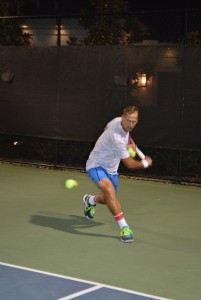by Randy Walker
@TennisPublisher
Jeffrey Burnett of North Palm Beach, Fla., is one of 24 players announced by the U.S. Tennis Association who will represent the United States at the ITF Seniors World Team Championships, the senior equivalent of tennis’ Davis Cup and Fed Cup competitions, in Helsinki, Finland June 19-24. Burnett, the President and CEO of Labor Finders International, will be representing the United States in the Fred Perry Cup, for men age 50 and over. The following are five questions I posed to Burnett about competitive “senior” tennis.
1) For the most part, tennis players stop playing competitive events after age 35. Why should they continue to play on past that age?
While this is true for most professional tour level players (though there are exceptions to this class of players as well), many who played college tennis took the time to raise families after college and returned to playing competitive tennis after the age of 35. It provides a balance for the working family person to have an outlet to being competitive again and meeting new friends or oddly enough get reacquainted with tennis friends they have not seen or heard from for decades. Besides a basic love for the game, playing competitively after age 35 provides for a healthy exercise option for life.
2) What age do you think is appropriate for competitive players to stop focusing on singles and play more doubles – from a competitive and a recreational perspective?
I do not believe there is any specific age. Many players enjoy playing both singles and doubles. Those that focus on doubles only may do so because they are just better doubles players than singles players while others may have some long term injury issues forcing them to just play doubles. Or it could be the case because of their work family lifestyle they only play doubles during the week and end up playing doubles mostly into their senior years.
3) Do you think there should be more competitive tournament opportunities for high-level players over the age of 35?
Short answer is yes. While we have many USTA national level tournaments, the ITF has virtually no tournaments in the US during the year. If you play a tournament outside the US, there is a very high likelihood it is an ITF event. In my opinion, this penalizes US senior players who would like to pursue a world ranking. Not sure why this is the case but rumors say the relationship between the USTA and the ITF is strained, if so, this may be the reason we do not have many senior ITF events in the US.
4) How has tennis contributed to your success in life, beyond just wins and losses?
Competitive tennis, like other competitive sports, teaches work ethic, discipline, sportsmanship, healthy lifestyle, fairness, honesty, and of course the obvious how to be competitive. All of these attributes contribute to a successful person off the court.
5) What is your favorite tennis tournament in the world to watch and why?
Wimbledon is my favorite for a couple of reasons. First, Wimbledon exudes the pure essence of class for the game of tennis – all whites, tradition, the royal box, strawberries and cream, the flowers, the English crowds. Second, the classic grass style of tennis (less so today with the slowing playing higher bouncing grass), shorter points, and more finesse and adjustment on the shots. And third, many professional players regard Wimbledon as the most esteem tournament on the tour and their most favorite. The old England club makes the venue something extra special.

